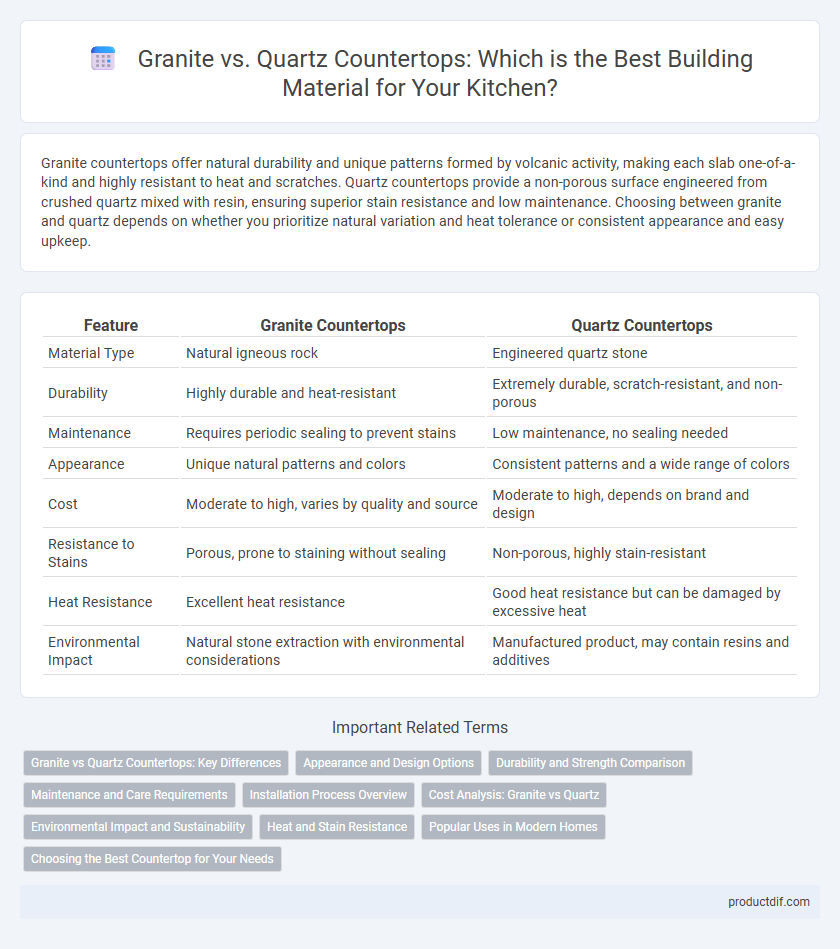Granite countertops offer natural durability and unique patterns formed by volcanic activity, making each slab one-of-a-kind and highly resistant to heat and scratches. Quartz countertops provide a non-porous surface engineered from crushed quartz mixed with resin, ensuring superior stain resistance and low maintenance. Choosing between granite and quartz depends on whether you prioritize natural variation and heat tolerance or consistent appearance and easy upkeep.
Table of Comparison
| Feature | Granite Countertops | Quartz Countertops |
|---|---|---|
| Material Type | Natural igneous rock | Engineered quartz stone |
| Durability | Highly durable and heat-resistant | Extremely durable, scratch-resistant, and non-porous |
| Maintenance | Requires periodic sealing to prevent stains | Low maintenance, no sealing needed |
| Appearance | Unique natural patterns and colors | Consistent patterns and a wide range of colors |
| Cost | Moderate to high, varies by quality and source | Moderate to high, depends on brand and design |
| Resistance to Stains | Porous, prone to staining without sealing | Non-porous, highly stain-resistant |
| Heat Resistance | Excellent heat resistance | Good heat resistance but can be damaged by excessive heat |
| Environmental Impact | Natural stone extraction with environmental considerations | Manufactured product, may contain resins and additives |
Granite vs Quartz Countertops: Key Differences
Granite countertops are natural stone with unique patterns and high durability, while quartz countertops are engineered stone offering uniform appearance and greater resistance to stains and scratches. Granite requires periodic sealing to maintain its resilience, whereas quartz is non-porous and low-maintenance, ideal for busy kitchens. Cost differences vary by grade, with granite often being more expensive due to quarrying, and quartz providing consistent quality through manufacturing.
Appearance and Design Options
Granite countertops offer a natural, unique pattern with a wide range of colors and intricate veining, providing a classic and earthy aesthetic. Quartz countertops feature a more uniform appearance with consistent color options and can be engineered to mimic natural stone while offering enhanced design versatility. Both materials allow for polished, honed, or textured finishes, but quartz provides broader customization in terms of patterns and embedded materials for modern and contemporary designs.
Durability and Strength Comparison
Granite countertops boast exceptional durability due to their natural formation, making them highly resistant to scratches, heat, and impact, ideal for heavy kitchen use. Quartz countertops combine natural quartz with resins, offering a non-porous, strong surface that resists staining and chipping better than granite. Both materials provide long-lasting strength, but quartz's engineered composition gives it superior resistance to moisture and bacterial growth, enhancing overall countertop longevity.
Maintenance and Care Requirements
Granite countertops require periodic sealing to prevent stains and maintain their natural luster, while quartz countertops are non-porous and do not need sealing, making them more resistant to bacteria and stains. Cleaning granite demands pH-balanced cleaners to avoid damaging the sealer, whereas quartz can be cleaned easily with mild soap and water or non-abrasive household cleaners. Both materials are durable, but quartz offers lower upkeep, ideal for homeowners seeking a low-maintenance surface.
Installation Process Overview
Granite countertops require precise measuring and cutting by skilled professionals due to their natural stone composition and weight, often involving specialized tools for accuracy and safety. Quartz countertops, made from engineered stone, allow for easier fabrication with standardized slab sizes and typically simpler installation methods, though careful handling is still necessary to avoid damage. Both materials necessitate a sturdy substructure and proper sealing to ensure longevity and durability post-installation.
Cost Analysis: Granite vs Quartz
Granite countertops typically cost between $40 to $100 per square foot, depending on the quality and origin of the stone, while quartz countertops range from $50 to $120 per square foot due to their engineered composition and brand premium. Installation costs for both materials are comparable, usually adding $35 to $75 per square foot, but granite may require more maintenance over time, influencing overall expenses. Quartz offers lower long-term costs because of its durability and minimal upkeep, making it a cost-effective choice despite the higher initial price.
Environmental Impact and Sustainability
Granite countertops are a natural stone mined from quarries, which involves significant energy consumption and habitat disruption, whereas quartz countertops are engineered using a mix of natural quartz and resin, often incorporating recycled materials, reducing waste. Granite is highly durable and recyclable, but the extraction process has a larger carbon footprint compared to quartz manufacturing, which can be more energy-efficient when using advanced technology. Quartz countertops typically offer more sustainable options due to their consistent use of byproducts and lower environmental degradation during production.
Heat and Stain Resistance
Granite countertops offer exceptional heat resistance, withstanding temperatures up to 480degF without damage, making them ideal for kitchen use near hot pots and pans. Quartz countertops provide superior stain resistance due to their non-porous surface, preventing absorption of liquids and minimizing discoloration over time. Both materials require proper sealing for granite, while quartz typically does not, enhancing durability against stains and heat.
Popular Uses in Modern Homes
Granite countertops are renowned for their natural durability and unique patterns, making them a popular choice for kitchen islands and bathroom vanities in modern homes. Quartz countertops, engineered for non-porous surfaces and low maintenance, are widely used in high-traffic areas like kitchens and laundry rooms due to their stain resistance and uniform appearance. Both materials enhance home aesthetics, with granite favored for its natural stone appeal and quartz prized for its versatility in design and color options.
Choosing the Best Countertop for Your Needs
Granite countertops offer natural durability and unique patterns, making them ideal for high-traffic kitchens that require heat resistance and scratch protection. Quartz countertops provide non-porous surfaces with low maintenance and a wide color range, perfect for stain resistance and modern aesthetics. Selecting between granite and quartz depends on factors like budget, maintenance preferences, and specific kitchen functionality demands.
Granite vs Quartz Countertops Infographic

 productdif.com
productdif.com